Democratic Republic Of Congo
The elections board in the Democratic Republic of Congo, DRC, early Thursday declared a president-elect in what will become the first peaceful transition of power in the troubled country.
Felix Tshisekedi, 56, was named winner of hotly contested elections of December 30, 2018. Son of a deceased opposition veteran will take over from outgoing Joseph Kabila.
The provisional results by CENI showed that Tshisekedi got over seven million votes representing over 38% of valid votes cast. He beat another opposition leader, Martin Fayulu, who came in second with about 35%.
Since the results were declared, there has been a series of reactions: victory celebrations in the capital Kinshasa, reported protests by Fayulu supporters and a diplomatic doubt as well as government and ruling party concession.
This LIVE page is to follow closely developments in the wake of the declaration.
Fayulu to mount legal challenge
The candidate who came second in the DRC polls, Martin Fayulu, has confirmed that he will be going to court to contest the December 10 results by CENI.
CENI declared Felix Tshisekedi winner of the polls but Fayulu has disclosed that the results were manipulated insisting thet he had won the polls by 61%.
Reports indicate that the Lamuka coalition which he leads will have to submit evidence to the court by close of day today and the court will have seven-days to deliver judgement.
Seeking legal redress: What Fayulu told the BBC
Defeated opposition candidate in DRC elections Martin Fayulu told the BBC’s Africa Editor that he will launch legal challenge to election result. In an inerview, he confirmed that his team are preparing their plan.
Mr Fayulu made clear he had little faith the move would succeed but said he did not want to give President Kabila excuse to say he had not followed the legal options.
Asked if he would call on his supporters not to demonstrate on streets, he said it was legal right of all Congolese to protest according to the law. “If you are not happy you protest according to the law.”
Asked if he worried about violence in the coming days and weeks? “Yes I worry if CENI doesnt give us the correct figures, if CENI continue to act as its acting now, if Mr Kabila and his team continue to dictate what the electoral commission has to do.”
UK joins diplomatic doubts, Fayulu heads to court?
United States and the United Kingdom have joined calls for clarity over the January 10 provisional results following doubts raised by France and Belgium.
The UK Foreign Secretary, Jeremy Hunt, wrote in a tweet: “Very concerned about discrepancies in provisional #DRC election results. Crucial that Congolese people’s democratic will is respected. Data and methodology MUST be examined. Pleased Security Council will discuss tomorrow.”
The US Congress’ House Foreign Affairs Committee also demanded the release of disaggregated voting data to help bolster public faith in the provisional outcome.
Its chairman Eliot Engel said: CENI “should release disaggregated voting data to bolster public faith in provisional election results. DRC deserves a transparent & accountable government & I will be watching this situation closely.”
The other main party to have questioned the results being the Roman Catholic Church who have stressed that the results did not match with tallies that their 4,000 observer team put together.
Claims of Kabila – Tshisekedi plot: how true?
A number of people on social media are drawing conspiracy theories around the Tshisekedi victory, claiming that a deal must have been reached between the president-elect and the outgoing president.
The theorists hold that with the ruling party’s candidate clearly staring at defeat, Kabila opted for the lesser of two evils in the opposition camp, the CACH coalition.
The other camp led by Martin Fayulu – the Lamuka coalition – has two of Kabila’s political arch rivals in the persons of Moise Katumbi, a former governor of Katanga Province and Jean Pierre-Bemba – a former vice president.
Below are some of the claims about a Tshisekedi – Kabila “love story.”
Kabila is sly.He knew his candidate flopped.He infilters the opposition& rigs in Tshisekedi despite another opposition leader Fayulu taking the lead.People talking of a new DR Congo are https://t.co/mcRuojKf5H's the same forest different monkey.Waiting for the Catholic ⛪ results
— Mukami (@Mukami_Mungai) January 10, 2019
Anyone who has been following Congo’s elections know that the results for presidential elections published tonight don’t reflect truth nor justice. Tomorrow and coming days will be a historical test for #Congo. #Telema #RDCVote #DRC #RDC
— kambale (@kambale) January 10, 2019
Wow, what a ride the #DRC Congo elections have been. Fayulu is widely thought to have beaten Kabila’s man Shadary, but Tshisekedi is named the winner (presumably after a backroom deal with Kabila.)
— Ty McCormick (@TyMcCormick) January 10, 2019
One wonders if Kabila put this little contingency plan in place back in November when Tshisekedi mysteriously pulled out of the unity deal a day after he’d agreed to it.
— Ty McCormick (@TyMcCormick) January 10, 2019
Did Tshisekedi just win the presidency or was he merely integrated into the Kabila regime? The coming hours and days will reveal much #DRC #Congo #Telema
— congofriends (@congofriends) January 10, 2019
What does electoral manipulation look like in Congo for the presidential election?
Catholic Church's independent tally:
Fayulu: 47%
Tshisekedi: 24%
Shadary: 19%Pres Kabila's concocted tally:
Tshisekedi: 38%
Fayulu: 35%
Shadary: 24% pic.twitter.com/ZT907Pdba9— Kenneth Roth (@KenRoth) January 10, 2019
Catholic Bishops say poll results ‘don’t add up’
The Catholic Church in DRC, CENCO, has reacted to the declaration of Felix Tshisekedi as president-elect of the country.
The church said results announced by the elections board, CENI, did not match with tallies it had through its observers.
CENCO had last week declared that its records from the vote showed that there was an outright winner from the December 30, 2018 elections. It’s declaration was slammed by CENI and the ruling coalition.
They did not mention who was the winner in their tallies but its widely believed to be Martin Fayulu who leads an opposition coalition, Lamuka. Fayulu has rejected the results and called for observers to publish their figures.
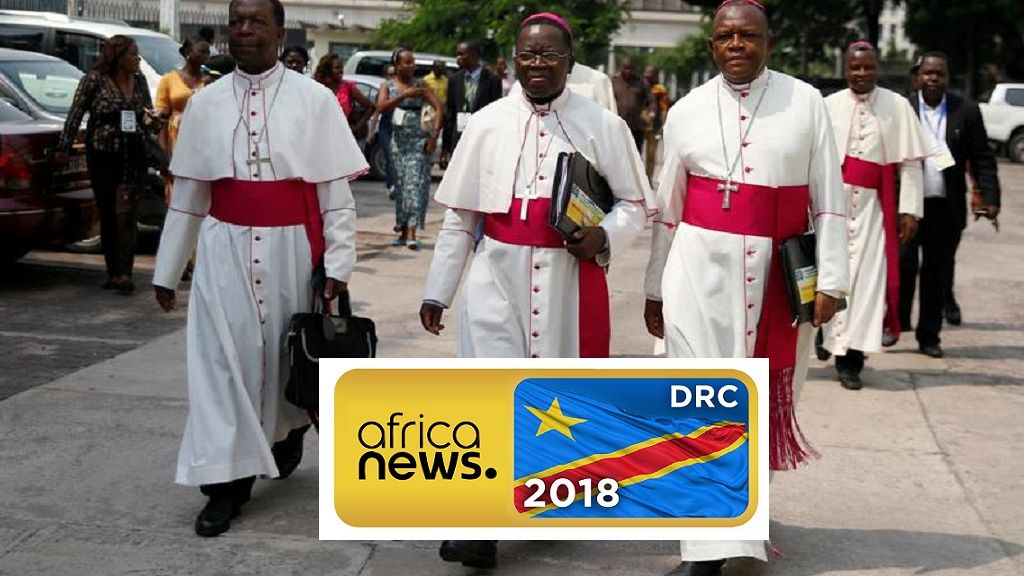
Internet restored after release of results
Internet has been restored across the country after a blackout that lasted over a week. Authorities justified the move and said it was to help avert the publication of fake results and compromising security.
People in the capital, Kinshasa, are now able to access the internet hours after the announcement of provisional results.
The BBC reports that persons in the eastern city of Goma had also confirmed that the internet was back. It remains to be known when the broadcast signal of French broadcaster, RFI and a local TV channel will be restored.
Amid the massive celebrations on the part of the Tshisekedi camp, pro-Fayulu supporters are protesting the defeat of their candidate.
Fayulu came second according to the results. He was leader of the Lamuka coalition, he has since called for the Catholic Church, SADC and AU to publish their versions of the results.
Brief about President-Elect Felix Tshisekedi
1 – Full name: Felix Antoine Tshisekedi Tshilombo, born on June 13, 1963 – aged 56
2 – Son of veteran opposition leader, late Etienne Tshisekedi. Dad founded Union for Democracy and Social Progress, UDPS, in 1982.
3 – In early twenties, went to Belgium for university education, later became national secretary for external affairs for the UDPS, based in Brussels.
4 – Father died in early 2017, UPDS picked Felix as party leader and by default presidential candidate.
5 – Joined and abandoned Lamuka coalition. Weeks later he announced a two-man coalition with Vital Kamerhe, the CACH coalition, in Nairobi.
6 – Declared president-elect after December 30, 2018 elections.
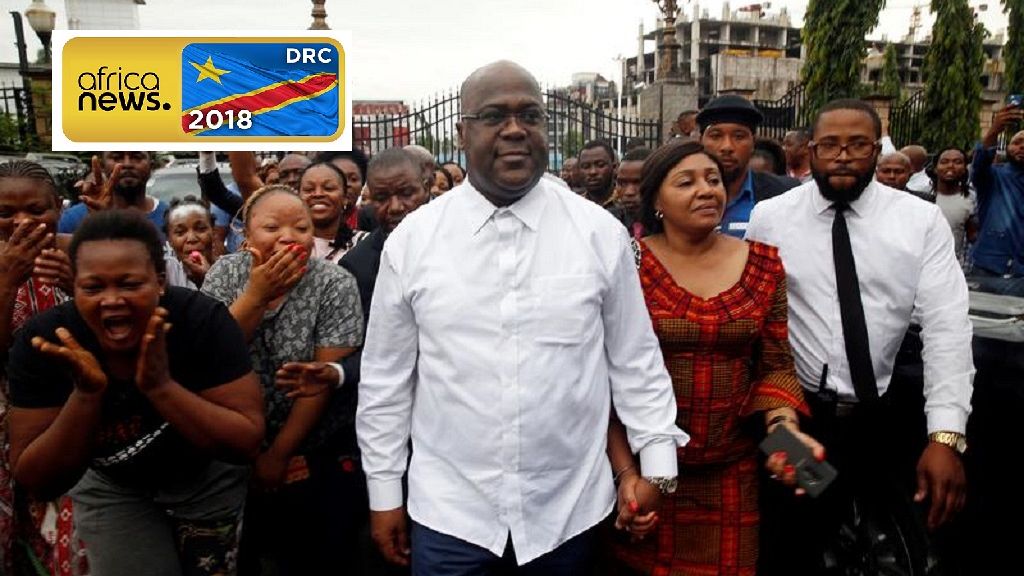
Statement from UN Secretary-General
The Secretary-General takes note of the announcement made by the Commission électorale nationale indépendante (CENI) of the provisional results of the 30 December presidential elections in the Democratic Republic of the Congo (DRC).
He commends the Congolese people and political actors for the conduct of the presidential, national and provincial legislative elections, which saw a broad and inclusive participation of political parties.
The Secretary-General calls on all stakeholders to refrain from violence and to channel any eventual electoral disputes through the established institutional mechanisms in line with the Democratic Republic of the Congo’s Constitution and relevant electoral laws.
The Secretary-General expresses the hope that the CENI, the Constitutional Court, the Government, political parties and civil society will each live up to their responsibility in preserving stability and upholding democratic practices in the Democratic Republic of the Congo.
The Secretary-General further reiterates the continued support and commitment of the United Nations, in collaboration with regional actors and international partners, for the consolidation of peace, stability and development in the Democratic Republic of the Congo.
Stéphane Dujarric, Spokesman for the Secretary-General
New York, 9 January 2019
Results as released by CENI
1 – Monsieur Félix Antoine TSHISEKEDI TSHILOMBO: 7,051,013 (38.57%.)
2 – Monsieur Martin FAYULU MADIDI: 6,366,732 (34.83%)
3 – Monsieur Emmanuel SHADARY: 4,357,359 (23.84%)
Voter turnout: 47.56%
Les trois candidats en lice à l’élection présidentielle ont obtenu:
1. Monsieur Félix Antoine TSHISEKEDI TSHILOMBO: 7.051.013 soit 38,57%.
2. Monsieur Martin FAYULU MADIDI: 6.366.732 soit 34,83%
3. Monsieur Emmanuel SHADARY: 4.357.359 soit 23,84%
Taux de participation: 47,56%— Ceni-rdc (@cenirdc) January 10, 2019
Fayulu calls for publication of independent results
A fellow opposition candidate, Martin Fayulu, has rejected the results of the December 30, 2018 which said he came in second behind president-elect Felix Tshisekedi.
In a statement from the coalition he led, Lamuka, he asked the Catholic Church and the regional SADC observer mission and the African Union to release their result tallies from the vote.
Meanwhile there are reports of protests in Fayulu strongholds given that his supporters insist that he was the duly elected candidate. The Catholic Church last week said its tallies showed that an outright winner had won.
Foreign media outlets later reported that the said candidate was Fayulu whose coalition included two barred aspirants and two other presidential aspirants.
A tous ceux qui ont pris connaissance de la vérité des urnes, nous vous demandons de révéler au peuple congolais et au monde entier, le nom de celui qui a réellement incarné le choix de notre peuple.
— Martin Fayulu (MartinFayulu) January 10, 2019CENCO__RDC#ECC SADC_NewsAUC_MoussaFakipic.twitter.com/CeMf8fU5B4
France and Belgium shocked by results
French Foreign Minister Jean-Yves Le Drian called for clarity on the election results, saying the surprise victory of Felix Tshisekedi was at odds with what was seen on the ground.
“We must have clarity on these results, which are the opposite to what we expected. The Catholic Church of Congo did its tally and announced completely different results,” Le Drian told CNews.
His Belgian counterpart also expressed similar views: “We have some doubts that we need to check and which will be debated in the coming days in the Security Council,” Mr Didier Reynders told the Belgian national broadcaster, RTBF.
Kinshasa slams Paris doubts over results
DRC’s information minister, Lambert Mende, in his initial comments about the results said the ruling FCC coalition takes note of the results and that it was surprised but respected the work of the election board, CENI.
On the claims by French Foreign Minister, Mende said Kinshasa disapproved the words of Jean-Yves Le Drain.
He slammed what he claimed was interference which he said the FCC rejects. He chided the Minister to approve a President for the Congolese people if he wanted.
Tshisekedi supporters break loose in Kinshasa
PHOTOS: Supporters of Felix Tshisekedi, leader of main opposition UPDS, who was announced as the winner of the presidential elections; celebrate along the streets of Kinshasa, Democratic Republic of Congo, January 10, 2019. pic.twitter.com/wdbA1M6EOq
— africanews (@africanews) January 10, 2019
PHOTOS: Felix Tshisekedi supporters “break loose” after he was declared winner of December 30, 2018 presidential polls. Scenes from the streets of Kinshasa, January 10, 2019.
FOLLOW OUR LIVE PAGE: https://t.co/ZlFsAdjPPB pic.twitter.com/NNRSKaAX9i— africanews (@africanews) January 10, 2019
‘Democracy has triumphed’ – Kabila’s top advisor
“Of course we are not happy as our candidate lost, but the Congolese people have chosen and democracy has triumphed,” one of outgoing Kabila’s top advisors has said.
Barnabe Kikaya Bin Karubi was reacting to the election results declared by CENI in the wee hours of Thursday.
The ruling coalition’s candidate and former Interior Minister, Emmanuel Ramazani Shadary, came in third in the December 30, 2018 long-delayed elections.
Tshisekedi pays homage to Kabila
“First of all I wish to thank God, the master of time and circumstances who allowed for such an event which a few weeks ago was still unimaginable.
“That is why I follow it directly with – and I know many of you find it hard to accept – but I say it with sincerity, I pay homage to President Joseph Kabila, President of the Republic.”
“Today, we must no longer consider each other as adversaries but rather as partners in democratic change in our country.” Speaking to thousands of cheering supporters in the capital Kinshasa, Tshisekedi said he would be the president “of all Congolese”.



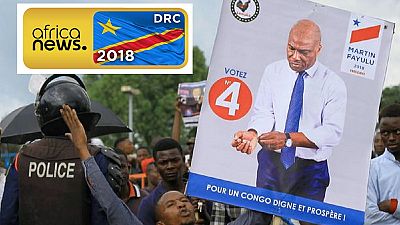

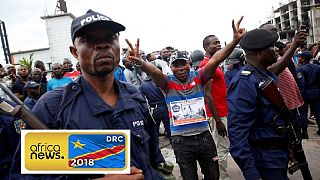
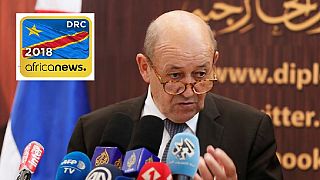
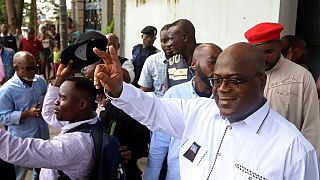


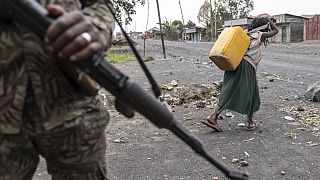



Go to video
Joseph Kabila’s return: Political comeback or threat to national unity?
Go to video
Kinshasa reacts to Trump's claim that 'many' Congolese come to US
Go to video
DRC: Goma Christians celebrate Easter under rebel rule
Go to video
Congo suspends Kabila's political party over rebel 'ties'
Go to video
Goma reacts to return of Kabila from exile
Go to video
Tanzania opposition says jailed leader not seen by family, lawyers